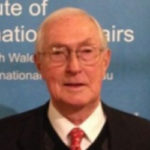GEOFF MILLER. ‘G5-Eyes’: a very strange economic grouping.
Jun 10, 2020According to a report in The Australian of 8 June Treasurer Frydenberg has “led the push” and succeeded in establishing a series of “regular and formal” economic dialogue meetings among the countries that make up the “Five Eyes” intelligence-sharing group.
The dialogue is to develop “a coordinated strategic economic response to the COVID-19 crisis”. This is an extraordinary expansion of the group’s role. From Australia’s point of view it is a very strange grouping within which to hold important economic discussions, omitting as it does both the EU and Australia’s very important Asian economic partners, including China, Japan, India, South Korea, Taiwan and Singapore.
The “Five-Eyes” intelligence-sharing arrangement grew up during the Cold War to share intelligence, particularly signals intelligence, about the Soviet Union. It was carried out by very specific, and very confidential, agencies in each country, and was almost never referred to in public. In the last year or two, however, at whatever instigation, its existence has become much more publicly and frequently referred to, with some meetings of senior representatives of the members quite fully reported in the media. Some of this reporting has tended to describe the “Five Eyes” arrangement as if it were a policy-making body, something it has never been—although, of course, the provision of intelligence can be a means of influencing a recipient country’s policy decisions.
As a grouping its membership bears the marks of its Cold War origins; it also evokes the “Anglosphere”, a concept which has been touted from time to time. It does not reflect the current disposition of global economic weight and influence, omitting as it does both Europe (except for Britain) and Asia.
The Treasurer is quoted in The Australian article as saying that “these meetings will be an opportunity to swap notes about the various economic initiatives each country is undertaking in response to the crisis”. But, of course, this is an odd grouping to study when it omits countries like Japan and South Korea, which have coped with the crisis very well, and includes the US and UK, neither of which has coped well from either the health or economic point of view. Both the G20 and APEC, of which we are members, are more inclusive.
Another rationale for the inception of these new meetings is given in the report. It says that “the agreement (to hold regular economic meetings) is seen by security experts as a hardening of the alliance between Western democracies in response to China, and the elevation of the Five Eyes alliance…..as central to a post coronavirus world”.
If this is the real rationale for the Treasurer’s initiative it seems an extraordinary thing for Australia to be advancing. Within the Five Eyes grouping the United States is by far the largest power, and it will undoubtedly have the major say in discussions and any recommendations that emerge. Yet the US under President Trump is locked in an immoderate struggle with China, which is our largest trading partner and takes 30% of our exports. Australian academic and media commentators are united in saying that in the future we should not simply rely on either the United States or China, and should rather think for ourselves and enhance self-reliance, working with our Asia-Pacific partners in ASEAN and beyond.
For years there has been criticism that Australia’s foreign policy is increasingly being seen too much through a “national security” lens. This present initiative seems designed to look at our important and established international economic relationships through the same valid but limited lens. Also for years, the worst-case scenario for the future has been seen as one in which the world becomes split into two competing camps, separated in connectivity, technology, economic activity and world views, with one side led by the US and one by China, each having little contact with each other. As a world trader we have joined in seeing this as the worst case, but this latest initiative by the Treasurer will make it more rather than less likely.
Geoff Miller is a former Australian diplomat and government official.




